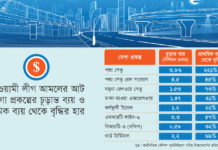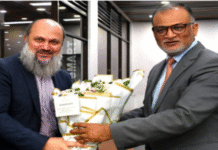
If the authority wants to continue performing its duties, it must do so by following the democratic process. Those contesting in elections will have to do so in a free and fair manner, without spending crores and using muscle power, said Prof Rehman Sobhan, chairman of Centre for Policy Dialogue, yesterday.
“If they [authorities] are pressed to come to power through a contest, they will know that they will not get votes if people’s problems are not resolved during their five-year tenure,” Rehman said.
The CPD chairman said, “If they are not concerned about votes and think that they will resolve problems using money and arms, then there will be no accountability.”
He said this while presiding over the “Public Hearing: National Development and Local Realities”, organised as part of various initiatives of Citizen’s Platform for SDGs.
The programme was held at the capital’s Krishibid Institution Bangladesh.
Around 35 men and women from different parts of the country, most of whom are from marginalised communities, raised their voices at the public hearing on various problems they are facing daily.
If they [authorities] are pressed to come to power through a contest, they will know that they will not get votes if people’s problems are not resolved during their five-year tenure.
Rehman said, “It cannot be denied that a lot of development works have been done in recent years… But there is a disparity between marginalised people’s claims of struggling to get government services and what the minister [Tazul Islam] is saying in response.”
Rehman, also director general of Bangladesh Institute of Development Studies, said the problems raised yesterday by the marginalised groups have been in place for years. “But why haven’t these problems been resolved yet?”
Pointing to various sufferings and problems of marginalised people, LGRD Minister Tazul Islam at the event said no government has been able to resolve the problems the way the present Awami League government has.
The minister, however, admitted that there are some failures and shortcomings in resolving those problems, which include inadequate quality health services.
About BNP MP Rumeen Farhana’s criticism that mega projects mean mega corruption, the minister said all the mega projects are for people to thrive.
Tazul, however, said there might be some unfairness and incidents of bribery in the energy sector.
Dhaka University Professor Emeritus Serajul Islam Choudhury said the 50 years of Bangladesh tells the story of development and disparity.
“Developments were made, but those developments are full of disparity. And exploitation is behind such developments,” he said.
Coming down heavily on noted cultural personality and Awami League lawmaker Asaduzzaman Noor, Prof Anu Muhammad said, “He [Noor] has said that they are working and representing the people… If elections are not held… how will they work as people’s representatives?”
He also pointed out the widespread mismanagement and corruption in financial and banking sectors.
Actor Mamunur Rashid in his speech came down heavily on Asaduzzaman Noor and the government, saying that they want to work unitedly to resolve the country’s problems. “But there is no environment in the country to work in an united manner.”
“We have no opportunity to work for SDGs. Now, black money controls everything in the country, and it is the government that creates this opportunity,” he added.
BNP MP Rumeen Farhana; Shujan secretary Badiul Alam Majumdar; Bangladesh Mahila Parishad president Fauzia Moslem; educationalist Rasheda K Chowdhury; noted economist Dr Hossain Zillur Rahman; and founder trustee of Impact Foundation Bangladesh Monsur Ahmed Chowdhury, also spoke at the programme.










